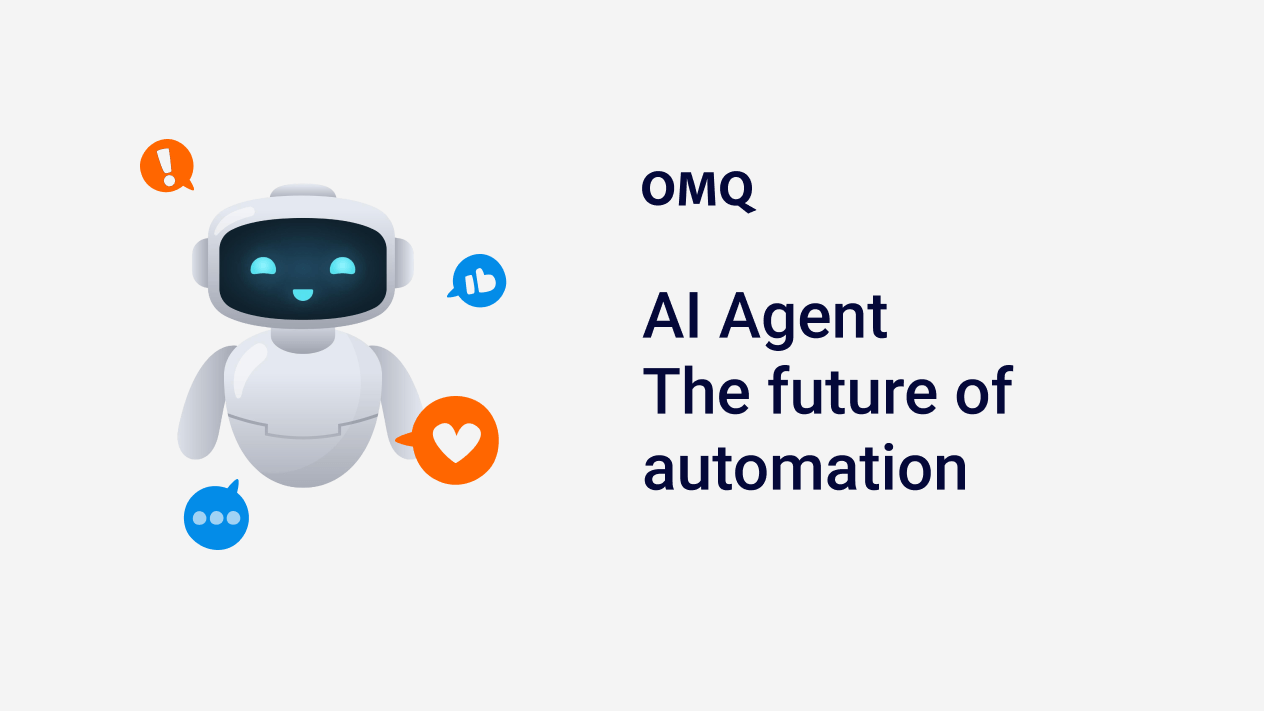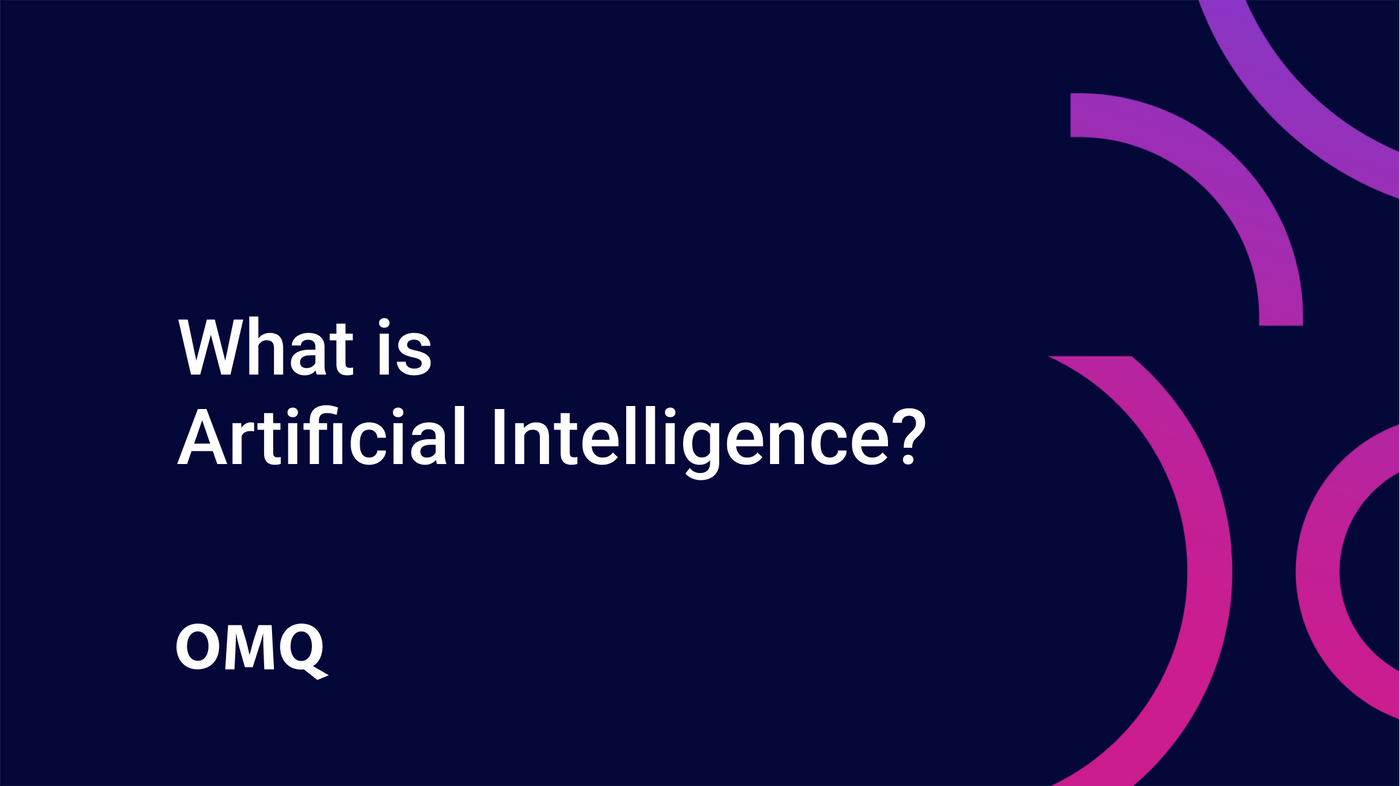Artificial Intelligence
What are AI Agents? A comprehensive overview
AI agents are autonomous software agents that use AI to perform tasks independently, make decisions and offer new opportunities for automation.

Artificial intelligence (AI) has revolutionized the way companies interact with customers. AI agents go one step further: they are efficient, scalable and intelligent.
In this article, you will find out how they work, what types there are and how you can start using them today.
What is an AI agent simply explained?
AI agents are autonomous systems that collect and interpret information and make decisions independently. Due to these features, they are often used to automate tasks in customer service and process automation.

Possible chat interaction with OMQ’s AI Agent.
AI agents can take on a variety of tasks - from answering simple questions to performing complex tasks - and continuously improve through self-learning.
AI agents…
- automate processes (e.g. repetitive tasks such as returns)
- answer customer queries in real time
- personalize support
How do AI Agents Work?
As already mentioned, AI agents are autonomous software units based on artificial intelligence. In contrast to simple language models (LLMs such as GPT), they are designed to perform specific tasks. The basis for this is formed by machine learning, data processing and decision models.

Simplified representation of how an AI agent works
Data Perception and Decision-Making
The first step in an AI Agent’s functioning is perceiving data from its environment. This data can come from various sources such as customer inquiries, sensor data, or online interactions. Using natural language processing (NLP) algorithms, AI Agents can understand human language and respond accordingly.
Once the data is collected, machine learning comes into play. Here, AI Agents use complex algorithms to recognize patterns in the data and make informed decisions. These decisions are based on previous experiences and continuous learning from new data.
Task Execution
After decision-making, AI Agents proceed to execution. This can involve a variety of tasks such as answering customer queries, managing databases, or performing specific actions within a company’s system. A significant advantage is the speed and accuracy with which AI Agents can complete these tasks.
Learning from Interactions
A standout feature of AI Agents is their ability to learn. Through each interaction, they gather new information and adjust their algorithms accordingly. This often occurs through reinforcement learning techniques where positive outcomes are reinforced while negative ones are minimized. Thus, AI Agents continuously improve their performance.
Multi-Agent Systems
In many cases, AI Agents do not work in isolation but within a multi-agent system. In such systems, multiple agents operate independently but interact with each other to achieve common goals. This collaboration allows them to solve complex problems more effectively than a single agent could.
Example request from e-commerce
To show how an AI agent works in detail, we have come up with a possible e-commerce scenario. The request from a customer is: “My parcel has not been delivered.”
What happens now?
-
Request is received: The customer inquiry is received via chat. Based on keywords such as “parcel”, “not delivered” or “delivery missing”, the AI recognizes that there is a delivery problem.
-
Customer information is collected: The customer is asked for their consignment number, for example.
-
Real-time data is retrieved: With the above information, the AI agent can find out current shipping information in the backend (delivery status, last scan point, details of the deliverer,…)
-
Responses are generated: Based on this data, the AI agent creates a situation-specific response.
Other integrated tools can then be used to perform additional tasks, such as shipment complaints, forwarding to service staff or arranging a replacement delivery if the loss is confirmed.
Technological Foundations
The technological foundation of AI Agents includes:
- Machine Learning: Algorithms help them recognize patterns and make informed decisions.
- Natural Language Processing (NLP): Enables them to understand human language and respond appropriately.
- Storage Systems: Robust storage systems are crucial for storing diverse types of information.
In summary, AI Agents are highly developed systems capable of acting autonomously and continuously learning through advanced technologies. Their ability for data perception, decision-making, and task execution makes them valuable tools in the modern business world.

Detailed presentation of the function of AI Agents.
What is the Difference between Chatbots and AI Agents?
In the world of artificial intelligence and automation, there are many terms that are often used interchangeably but actually have different meanings. Two of these terms are “Chatbots” and “AI Agents.” Although they utilize similar technologies, they differ significantly in functionality and application. Let’s take a closer look at the differences.
Chatbots: The Conversationalists
Definition and Function
Chatbots are programs specifically designed to engage in conversations with users. They are frequently used in customer service applications to answer simple inquiries or provide information. Chatbots typically operate on rule-based systems or use basic machine learning algorithms for natural language processing (NLP).
Application Areas:
- Customer Service: Answering FAQs
- E-Commerce: Assisting with purchasing decisions
- Social Media: Automated interactions with users
Limitations:
Chatbots often rely on predefined scripts or databases, which limits their ability to handle complex tasks beyond those parameters.
AI Agents: The All-Rounders
Definition and Function:
AI Agents, on the other hand, are more advanced systems that can not only conduct conversations but also autonomously perform complex tasks. They utilize advanced machine learning techniques and can learn from interactions and adapt to new situations.
Application Areas:
- Business Process Automation
- Data Analysis and Decision Making
- Multi-Agent Systems for Problem Solving
Advantages:
AI Agents can operate independently, make decisions, and execute tasks that go far beyond the capabilities of a simple chatbot. They are flexible and adaptable to various environments and requirements.

Difference between conventional chatbots and AI agents.
Summary of Differences
- Complexity of Tasks: Chatbots are limited to simple conversations, while AI Agents can autonomously manage complex tasks.
- Learning Ability: AI Agents continuously learn from experiences and adapt; chatbots mostly follow predefined rules.
- Application Scope: While chatbots are primarily used for customer interaction, AI Agents find applications in a wide range of business processes and industrial applications.
Overall, it can be said that AI Agents represent an evolution of the technology that originated with chatbots. Both have their place in the digital landscape, but AI Agents offer significant added value for companies with more complex requirements due to their versatility and adaptability.
Types of AI Agents
There are various types of AI Agents, each with specific functions:
- Simple Reflex Agents: React based on condition-action rules.
- Model-Based Reflex Agents: Have an internal model for environmental perception.
- Goal-Based Agents: Designed to achieve specific goals.
- Utility-Based Agents: Make decisions based on utility assessments.
- Learning Agents: Evolve through reinforcement learning.
- Hierarchical Agents: Structure with higher-level agents guiding subordinates.
Possible Applications for AI Agents
AI Agents find applications in numerous areas:
Efficiency Enhancement in Customer Service
By deploying AI Agents, companies can significantly enhance their efficiency. These systems can handle multiple interactions simultaneously and are available around the clock. This not only optimizes operational time but also increases customer satisfaction through quick and precise responses.
Scalability and Data-Driven Insights
AI Agents offer scalability for managing increased interaction volumes while providing data-driven insights for better decision-making. Through consistent responses, they foster trust and reliability among customers.
Industry-Specific Applications
In various industries, AI agents unleash their potential:
- Finance: Personalizing customer service
- Manufacturing: Predicting maintenance needs
- Consumer Goods: Inventory management
- Automotive Industry: Monitoring fleet performance
- Healthcare: Managing patient interactions
Use Cases of AI Agents in Businesses
The OMQ Automator is an outstanding example of efficiently using an AI Agent in a business environment. As a virtual employee, it automates tasks in customer service directly within the backend system. The Automator can change addresses, manage subscriptions or check order statuses—all without human intervention—supported by other OMQ products like chatbots or help services.
OMQ Automator impressively demonstrates how AI-based solutions can provide tailored responses to individual customer inquiries. With its support, leading companies worldwide benefit from automated customer service.
Conclusion: AI agents as powerful support systems
AI agents represent significant advancements business technology; they contribute substantially towards increasing efficiency automation complex tasks while offering valuable insights through data analysis. The OMQ Automator showcases impressive potential these systems practice—a future full possibilities awaits us!


